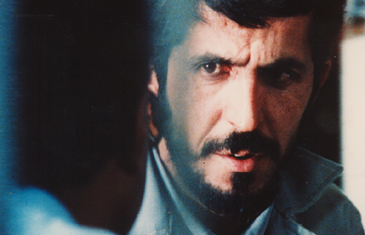 One of the earliest features that brought Kiarostami to the attention of Western critics (indeed this was one of Cahiers du Cinema's top five films of 1991), 'Close Up' is a curious film that is based on a real life incident where a man named Hossain Sabzian was initially mistaken for the Iranian director, Mohsen Makhmalbaf, but then assumed his identity to immerse himself in a middle class Iranian family's house and lives for no obvious reason. The stylistic conceit here is that Kiarostami films partly in documentary style and also partly as a standard re-enactment of events with the real individuals involved (thus you have Sabzian repeating his fraud over again and so on). Kiarostami himself films the trial of Sabzian (which apparently isn't standard practice - even the judge wonders why he's filming such a trivial case given the standing of him as a film maker) and a journalist (Hossain Farazmand) who wants to understand the whole incident.
One of the earliest features that brought Kiarostami to the attention of Western critics (indeed this was one of Cahiers du Cinema's top five films of 1991), 'Close Up' is a curious film that is based on a real life incident where a man named Hossain Sabzian was initially mistaken for the Iranian director, Mohsen Makhmalbaf, but then assumed his identity to immerse himself in a middle class Iranian family's house and lives for no obvious reason. The stylistic conceit here is that Kiarostami films partly in documentary style and also partly as a standard re-enactment of events with the real individuals involved (thus you have Sabzian repeating his fraud over again and so on). Kiarostami himself films the trial of Sabzian (which apparently isn't standard practice - even the judge wonders why he's filming such a trivial case given the standing of him as a film maker) and a journalist (Hossain Farazmand) who wants to understand the whole incident.Thus what Kiarostami presents us with is a world where nothing is quite as it appears. The lines between fact and fiction become blurred, especially in the mind of Sabzian who maintains the pretence that he is Makhmalbaf. Kiarostami has always shown an interest in "cinema" in his films - his later 'Through the Olive Trees' was about the making of an actual Kiarostami film in many ways. Is Kiarostami suggesting cinema is a chronicler of real life (hence the pseudo-documentary nature of them) or that they're distinctive entities? The media are partly shown to be culpable for the fraud of Sabzian too. Their constant reporting on Makhmalbaf surely made his life appear glamorous to Sabzian and therefore encouraged his deception when the opportunity arose.
Sabzian's motivations though aren't nefarious - he is a poor and humble man whose wife has left him and he lives with his mother. He has no hopes and ambitions and contemporary Iranian society has no obvious place for him. He has no job and self-esteem and admits that the fraud gave him the only chance in his life to feel important and to be respected - people actually listened to him and his opinions. Sabzian (as Makhmalbaf) explains that he is visiting a family because directors should show humility and live closely with those people he wishes to film. Sabzian is a man who would live a normal life if given the chance. His fraud was born out of desperation. Kiarostami's ultimate display of sympathy is one of the final shots of the film, as he rides with Sabzian on a motorcycle before visiting the man he impersonated. 'Close Up' is a shining example of Kiarostami's humanism and another superb demonstration of his interests in the distinction/convergence between cinema and life. 4.5/5
No comments:
Post a Comment